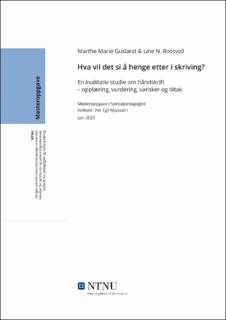| dc.description.abstract | I denne studien ble åtte lærere og spesialpedagoger intervjuet om hvordan de bedømmer et utvalg håndskrevne elevtekster, og hvor de setter grensen for bekymret/svært bekymret med tanke på å finne elever som henger etter i skriving. Vi fant at det er samsvar blant informantene ved at de uttrykker bekymring for noen av de samme elevtekstene, og at de bedømmer mange av tekstene på likt grunnlag. Vi fant også at den mest brukte prosedyren for å evaluere elevenes håndskrift kan sees på som unyansert og subjektiv, og at lærerens kunnskap og erfaring spiller stor rolle i arbeidet med skriveopplæringen.
Forskning viser at elever lærer mer når de skriver for hånd, og at læringen kan optimaliseres med håndskrevne notater i kombinasjon med visualiseringer (van der Meer og van der Weel, 2017). Likevel viser det seg at håndskriftsundervisningen har liten plass i lærerutdanningen, og i denne studien reflekterer vi rundt det som kan ansees som misoppfatninger om skriving. Vi har også sett på hva informantene ville gjort videre for elever som strever med håndskrift, der funnene viser store forskjeller i prosedyrer og tiltak. Motivasjon, mestring og skriveglede er nøkkelord i empirien, og informantene rapporterer at støtte og individuelle tilpasninger for hver enkelt elev kan bidra til mestring og skriveutvikling.
På bakgrunn av empirien har vi funnet fem hovedtemaer: skriftforming, mestring og skriveglede, individuelle tilpasninger, bekymring for elevtekster og tiltak, som bidrar til en forståelse av informantenes erfaringer og kunnskap. Hovedtemaene gir informasjon om hvordan informantene bedømmer et utvalg håndskrevne elevtekster med tanke på å finne elever som henger etter i skriving, og hvordan de ville arbeidet videre etter bekymring. Det er lovpålagt å tilby intensiv opplæring for elever som strever med å skrive, men våre funn indikerer at det ikke er noen klare retningslinjer på hvilke elever som strever, eller hvilke tiltak som skal settes inn. | |
| dc.description.abstract | In this study, eight teachers and special education teachers were interviewed. The study explores how they would assess a selection of handwritten texts by students, and how they would distinguish between worried and highly worried regarding the students writing development. A compliance among the informants was found, seeing as they categorize the same texts as concerning, and that they are consistent in the basis they use to evaluate the texts. Moreover, the study established that the most used procedure to evaluate the student’s handwriting can be considered as oversimplified and subjective, and that the education of writing skills is greatly affected by the teacher’s knowledge and experience.
Research shows that students develop greater writing skills when they complete the work by hand, and that the teaching can be optimized by combining handwritten notes and visualization (van der Meer and van der Weel, 2017). Nevertheless, within the curriculum of a teacher’s education, teaching handwriting lessons are not prioritized. Therefore, this study will also reflect upon what can be considered the misconceptions of writing. Additionally, how the informants would proceed to help the students who are struggling with their handwriting skills was investigated further, which showed a considerable inconsistency in procedures and measures. Empirical research shows that motivation, accomplishment and gaining joy from writing are significant aspects, and informants reported that support and individual adjustments for each student can contribute to their success and writing development.
Based on the empirical research, five main themes were established: writing construction, accomplishment and the joy of writing, individual adjustments, concern for student’s texts, and strategies, which contribute in the understanding of the informants’ experience and knowledge. Additionally, the themes assisted in gaining information about how the informants assess a selection of handwritten work, regarding which students are deficient in their writing development, and how they would proceed after a concern was acknowledged. By law, teachers are obliged to initiate adjustments for the students who struggles with writing. However, our findings illustrate the absence in definite guidelines to which students that can be categorized as struggling, what adjustments that should be made and which strategies should be taken. | |
